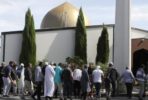Israeli police Sunday entered Jerusalem’s Al-Aqsa mosque, one of Islam’s holiest sites, as they clashed with Palestinians angered by Jews’ access to the compound on an annual day of Jewish mourning.
Palestinians threw stones and fireworks while police fired stun grenades after security forces entered the Al-Aqsa compound, which is also revered by Jews, before briefly going inside the mosque itself.
Police said they went a few metres (yards) into the mosque to shut the doors in a bid to restore calm and lock in rioters who were inside.
About 300 security personnel had entered the compound when the clashes began with about 200 Palestinians, an AFP photographer reported.
The Palestinian government said Israel’s actions proved it wanted to “drag the region into a religious war”.
Jordan, the custodian of the compound, said: “The repeated Israeli violations of the sanctity of the holy site are a provocation against the feelings of Arabs and Muslims… designed to ignite further hostility.”
It was the first time Israeli security forces had entered the mosque since November, when clashes with worshippers also erupted.
There were multiple arrests linked to the latest clashes, which came as Jews sought to access the mosque compound to mark Tisha B’av, a day commemorating the destruction in ancient times of the first and second temples.
– Major flashpoint –
Palestinians were angered by what they considered intrusions by Jews. Visits are allowed, but Jewish prayer at the site is prohibited.
The hilltop compound in Jerusalem’s Old City, one of the biggest flashpoints in the Middle East, is the most sacred site in Judaism and Islam’s third holiest, after Mecca and Medina. Jews refer to the site as the Temple Mount.
Police said Palestinian youths had prepared to clash with them, spending the night in the mosque in which they had stored stones and fireworks, as well as wooden planks to prevent police from closing the doors.
Upon seeing police at the northern steps to the mosque in the morning, “they began throwing stones at them and firing fireworks”.
They then barricaded themselves in the mosque, from where they continued to attack the forces, according to authorities.
“In light of the severe confrontation and the escalating actions of the rioters and with the aim of preventing further injury to police… forces entered a number of metres inside and closed the doors to the mosque with the rioters inside, restoring order,” police said.
Police reinforcements had deployed in the Old City overnight for fear of unrest as thousands of observant Jews flocked to the Western Wall, located below the mosque complex, for the annual prayer ceremony.
The police said that after their brief foray into the mosque, they withdrew and the area was quiet. Access to the site was later restricted.
– ‘Ready to die’ –
Protests broke out in the lanes and alleyways of the Old City around the mosque, with demonstrators confronting police and chanting “Allahu Akbar (God is greatest)” and police firing stun grenades.
Some vowed to protect Al-Aqsa, with one man saying the holy site “is in our blood”.
“We are ready to die,” said Khaled Tuffaha, a 46-year-old Palestinian shop owner. “Everybody is ready to die.”
One 22-year-old Jewish religious student, carrying a Torah holy book and who said he was briefly in the compound during the clashes, argued that Jews and Muslims should share access.
“One day for Jews, one day for Muslims,” he said.
Police said a young Jewish man attempted to enter while wearing phylacteries — small leather boxes containing sacred texts worn by observant men during morning prayer.
When told to remove them, he resisted and grabbed hold of railings, biting a policeman who tried to remove him before he was arrested.
At least three stone-throwers were detained and four police were lightly wounded, authorities said.
One Palestinian man was seen bleeding from the head and protesters spoke of further injuries.
After Israeli police entered the mosque in November, Jordan — one of the very few Arab states with diplomatic relations with Israel — recalled its ambassador for three months.
Israel seized east Jerusalem in the 1967 Six-Day War and later annexed it in a move never recognised by the international community.
Israel considers all of Jerusalem as its indivisible capital, but the Palestinians claim the eastern sector as capital of their promised state.
Source: https://sg.news.yahoo.com







